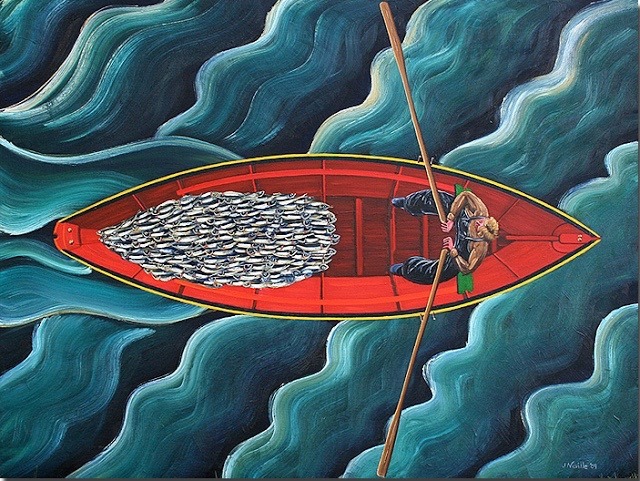Day’s Catch If I were a bird flying above If I were a bird watching the waves ripple like a girl’s hair that falls over her shoulders blue and black and silver in regular ripples thick and thin— If I was a bird seeing you in your boat angling across the waves leaving behind a wake, a different sort of rippling wave that makes its own pattern like a fish’s tail— If I saw your red boat floating on the blue green waters— If I saw your boat full of shining fish all laid head to tail as if they too were swimming, a school of shimmering bodies, cutting across the wave at the same angle— If I saw your marvelous catch of silver fish like links of mail, like a coat of coiled links like shimmering scales of armor swimming in your red boat as you row across the blue-black waves I would cry. Oh I would cry. And you would hear my cry as you rowed across the waves in your red boat. You would hear my cry and it would fill your soul with longing for the shore and for deep waters with longing for you don’t know what. My bird’s cry would make you weep, tears welling in your wind-stung eyes, so you aren’t sure which is calling them forth: the wind or the crying. You would cry for all that you have lost and cry for the things you no longer remember. You would mourn with the mourning of a seabird who can’t remember where home is who has no nest but the wind and waves and who lays her eggs on a barren rock carved smooth by wind and waves besieged and defiled by the monstrous flocks and graced by the basking seals. If I were a bird and you were rowing across the sea you would avoid the rock where I raise my young the widow-making rock where so many ships have gone astray where boats like yours meet their doom. Beware the rock, O fisherman Beware, rower of the red boat. Beware the crashing of waves and the calling of the gull. Row, row your little boat to harbor with your hard-won catch. Catch hold of all you can of this day: the rippling waves, the red boat, the silvery fish, the oars in your hands, the calls of the gulls and the wind, and the slap of the waves and the sigh of the sea. You have caught so much more than you guessed and tonight mending your nets by the fireside your heart will be caught in a dream your mind beguiled by all you have known— the gulls’ wings against a wide sky spread and the sadness at the heart of the sea.
notes and further reflections:
It’s been quite a while since I was even able to sit down and work on poetry. Tonight I told myself I was just going to look at a painting and do a writing exercise and this poem surprised me. Such a lovely gift.
The other day I was reading T.S. Eliots Dry Salvages, one of my favorites, and trying to remember exactly where the rocks called the Dry Salvages are– I knew they were off the coast of Cape Ann in Massachusetts, but exactly where? — I stumbled on this lovely blog post by a kayaker who paddled out to visit the Dry Salvages.
I knew they were a real place, I wanted to know what they look like. And now… after they’ve worked their way into my poem– rocks, gulls, seals, wrecks and all– I’m wondering why they were haunting Eliot’s imagination. At two miles out, can you even see them from shore? This lovely Boston Globe column by James Parker helpfully reminds me of the note that mentions that they have a beacon on them. Maybe it’s the beacon that caught his imagination and the name? Ah… it also informs me that Eliot saw them from a sailboat: “Trapped in wartime England in 1940, Eliot found his imagination traveling back to the seascapes of his boyhood, his summers in Gloucester, Mass., his sailboat voyages between Cape Ann and Maine with his friend Harold Peters, and then beyond them, towards the wild and watery origin of everything.”
This is a lovely column, by the way, sadly, behind a paywall. So I’ll excerpt Parker’s opening reflection on the name of the poem and Eliot’s note, which is the best close reading I’ve seen on it:
THE DRY SALVAGES— presumably les trois sauvages— is a group of rocks, with a beacon, off the N.E. coast of Cape Ann, Massachusetts. Salvages is pronounced to rhyme with assuages. Groaner: a whistling buoy.”
So runs the little note at the beginning of T.S. Eliot’s “The Dry Salvages,” third poem in his sequence Four Quartets. The note is a poem in itself, really: factual-sounding at first, nearly pedantic, a miniature lecture (on etymology, pronunciation, definition) that nonetheless deepens on every side into shivery Eliotic resonance. He could have used pages, our poet, or rages—but no, it had to be the King James-y assuages. Suffering and succor. The name of the rocks themselves: aridity, salvation. And floating out there somewhere, the hopeless, enduring, sad old groaner.
And one more excerpt for good measure because this really is a lovely essay, part travelogue and part literary criticism, from Parker’s conclusion:
You know when you’ve stepped inside a poem: You feel it, you hear it, the tuning-fork hum of a superior imaginative energy. While the tension holds, everything around you has a strange and dreamlike valence. Visiting the Dry Salvages is not like that. As we lurched towards the rocks, and began to hear the smack and suck of the waves at their rough ledges, I was only, glumly, aware of a kind of age-old lumpiness in reality—a hardness, a juttingness. The roosting cormorants disapproved of us. Three seals raised their heads above the water and regarded us with empty curiosity.
These rocks were concrete, unmetaphorical, and navigationally significant. You couldn’t befriend them. You didn’t want to mess with them. The sea pitches you, the rocks smash you—a state of affairs never quite, in the end, to be accommodated. “You cannot face it steadily,” wrote Eliot, “but this thing is sure….” The Dry Salvages give you no help. Raw material? Only for the greatest of poets.







This is very beautiful. Thank you, Melanie.
Thank you, Zagorka.
Marvellous imagery! I particularly love the simple power (and the lovely rhythms of assonance and alliteration) of this litany:
“the rippling waves, the red boat,
the silvery fish, the oars in your hands,
the calls of the gulls and the wind,
and the slap of the waves and the sigh of the sea.”
Thank you!
This was one of those pieces that write themselves in a rush with very little labor pains– and it came out so well that I was afraid to tinker with it too much, so I just posted it. I’m still re-reading it and delighting in noticing how the various sections work. I probably will end up editing a bit more later, but it’s nice to have thoughtful readers to tell me what works.